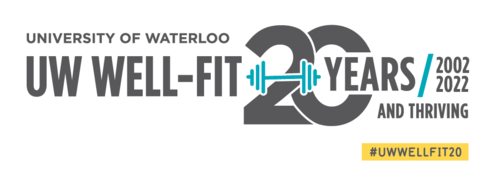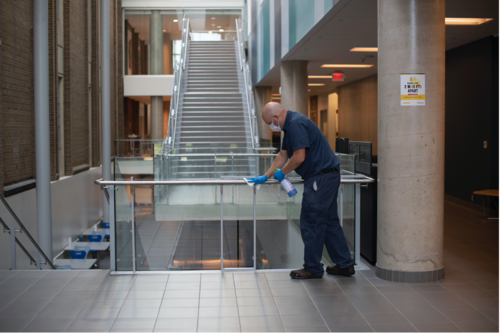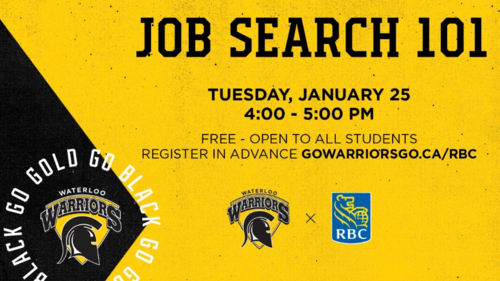The Daily Bulletin is published by Internal and Leadership Communications, part of University Communications
Contact us at bulletin@uwaterloo.ca
Submission guidelines
Editor:
Brandon Sweet
University Communications
bulletin@uwaterloo.ca
"Yesterday, the Government of Ontario announced steps to cautiously and gradually ease public health measures," write President and Vice-Chancellor Vivek Goel and Vice-President, Academic & Provost James Rush in a memo circulated to campus today. "The evidence shows that our collective efforts to reduce the transmission of Omicron are having an effect and we can continue our cautious return to in-person experiences."
"For the University, the announcement means that we will continue to deliver essential in-person teaching and learning as we have done since January 4, and we will gradually transition to full in-person experiences with most in-person instruction starting on February 7."
"While COVID-19 continues to circulate in our community, individuals who are vaccinated and follow public health advice are protected from its more serious consequences. We have confidence in our return to in-person experiences as greater than 99 per cent of people who come to the University to live, learn and work are fully vaccinated against COVID-19 – and many of you have also had booster doses."
"We know that this transition from remote learning and working to in-person experiences will worry some people," the memo continues. "We are also mindful of the significant pressure and negative effects that this latest lockdown is having on the physical and mental health of so many of us. In deciding to return to in-person experience in February we are striving to meet the needs of our students to have a meaningful university experience. We also want to make sure that the transition for our employees is clear and transparent. To reduce the density of people on our campuses we will have a gradual return for those who do not interact with students directly."
"In detail, our return to in-person experiences in February means:
Most course-based instruction will resume in person on Monday, February 7 including labs, seminars, groups, lectures, tutorials and more. Students should prepare to be back in Waterloo from this date.
We will continue to deliver some large lectures online until February 28. Students and Teaching Assistants can expect to hear more from individual Faculties on plans for specific large classes in the coming week. We will also share these details on our COVID-19 information website. We remain committed to providing at least 14 days’ notice of changes to the mode of delivery of these specific classes.
Recreation facilities and dining spaces will reopen in line with the 50 per cent capacity limitation from January 31, per the regulations.
Open study spaces will continue to be available with physical distancing and masking requirements, in line with government direction. Study/lounge and other dining areas will also provide space for students to eat and will be monitored for capacity and student compliance with distancing and masking expectations.
Employees who support in-person student experiences should prepare to return on February 7 or before, depending on their unit’s needs.
Employees who are currently working remotely should be ready to return to campus starting February 7 with the goal of a return to normal in-person working arrangements no later than March 14. Individuals can expect to hear from their unit head on specific plans for their return to in-person working.
Researchers will continue activities under our current arrangements. We will communicate any changes, such as for human-participant research, in the coming weeks.
"Our transition to full in-person experiences requires us to maintain some important public heath precautions, including mask-wearing in all common use indoor spaces. Evidence suggests that wearing a well-fitting three-layer mask with a middle filter layer is effective in preventing transmission of COVID-19."
"Everyone coming to campus must also continue to complete the Campus Check-in screening questionnaire and you should stay away from the campus if you have any symptoms of COVID-19. You are not permitted to come to campus unless you have provided proof of vaccination or obtained a University-approved accommodation."
"We are both very grateful for your patience and understanding as we seek to get back to safe and vibrant in-person experiences for everyone at Waterloo, the president and provost's memo concludes. "We know that the ongoing uncertainty has been difficult for you to manage and that some of you will continue to face challenges as we make the shift back to learning and working in person. We encourage you all to be mindful of the individual circumstances of people around you, and to consider their needs as we move ahead."
Read the full memo on the COVID-19 website.

The UW WELL-FIT cancer exercise program celebrates 20 years in 2022, with several activities for the Waterloo community, as well as current and former participants, volunteers and friends.
These events include a group Fitness Challenge in May, a family-friendly Community BBQ and open house on June 5 and a Roaring 20s Gala dinner event on November 12. The goal throughout the year is to raise funds to support individuals who can benefit from this programming as they combat the negative side effects of cancer.
Now housed in the Centre for Community, Clinical and Applied Research Excellence (CCCARE), UW WELL-FIT began in 2002 and has since helped more than 2,000 individuals with cancer manage the effects associated with the disease, as well as improve their health and well-being through lifelong friendships and support. It has also trained thousands of students to deliver targeted exercise programming, and many have gone on to become health-care professionals.
Watch for details about the events throughout the year, or if you’d like to make a charitable donation to the program, please complete Waterloo’s secure online donation form and select "UW WELL-FIT Program" from the list of options. If you’re interested in becoming a corporate sponsor, visit the WELL-FIT 20th anniversary web page, or contact us.

This article was originally published on Waterloo News.
Using artificial intelligence (AI) researchers have found that between 2007 and 2016 online sentiments around climate change were uniform, but this was not the case with vaccination.
Climate change and vaccinations might share many of the same social and environmental elements, but that doesn’t mean the debates are divided along the same demographics.
A research team from the University of Waterloo and the University of Guelph trained a machine-learning algorithm to analyze a massive number of tweets about climate change and vaccination.
The researchers found that climate change sentiment was overwhelmingly on the pro side of those that believe climate change is because of human activity and requires action. There was also a significant amount of interaction between users with opposite sentiments about climate change.
However, in the snapshot of the timeframe of the dataset, vaccine sentiment was nowhere near so uniform. In fact, only some 15 or 20 per cent of users expressed a clearly pro-vaccine sentiment, while around 70 per cent expressed no strong sentiment. Perhaps more importantly, individuals and entire online communities with differing sentiments toward vaccination interacted much less than the climate change debate.
“It is an open question whether these differences in user sentiment and social media echo chambers concerning vaccines created the conditions for highly polarized vaccine sentiment when the COVID-19 vaccines began to roll out,” said Chris Bauch, professor of applied mathematics at the University of Waterloo. “If we were to do the same study today with data from the past two years, the results might be wildly different. Vaccination is a much hotter topic right now and appears to be much more polarized given the ongoing pandemic.”
The research goal was to learn how sentiments on climate change and vaccination may be related, how users form networks and share information, the relationship between online sentiments, and how people act and make decisions in daily life.
“There’s been some work done on the polarization of opinions in Twitter and other social media,” said Madhur Anand, professor of environmental sciences at the University of Guelph. “Most other research looks at these as isolated issues, but we wanted to look at these two issues of climate change and vaccination side-by-side. Both issues have social and environmental components, and there are lots to learn in this research pairing.”
The dataset for the project was drawn from a few sources, including some that were purchased from Twitter. In total, the analysis takes into consideration roughly 87 million tweets. The time range for the tweets is between 2007 and 2016.
This means that the data precedes COVID-19 and offers a snapshot of vaccine sentiment in the years leading up to the pandemic.
The AI ranked the millions of tweets as either pro, anti or neutral sentiment on the issues and then classified users in pro, anti or neutral categories. It also analyzed the structure of online communities and the degree to which users with opposing sentiments interacted.
“We expected to find that user sentiment and how users formed networks and communities to be more or less the same for both issues,” said Bauch. “But actually, we found that the way climate change discourse and vaccine discourse worked on Twitter were quite different.”
Anand, Bauch and team members Justin Schonfeld, Edward Qian, Jason Sinn, and Jeffrey Cheng published their findings, “Debates about vaccines and climate change on social media networks: a study in contrasts,” in the journal Humanities and Social Sciences Communications.

A message from Human Resources.
Conversations about change have never been more prevalent in our working world. How we think about change has changed! In partnership with Organizational and Human Development (OHD), the Office of the Associate Provost, Human Resources offers Change Management focused workshops on successfully navigating and leading change.
Workshops are open to employees, and registration is available through Portal.
Winter term offerings include:
Looking for a full team experience? Workshops are also offered as custom sessions to your group to help your team learn more about and manage change. Testimonial about our team experience: “Helpful, insightful, upbeat workshop experience supported by great resources. We all learned something about ourselves and our teams!”
If you have any questions about our offerings, or the registration process, please contact Samantha Murray, Change Management Advisor.

A Q&A event about the Region of Waterloo staff redeployment and volunteer opportunities will be taking place today at 12 noon. Speakers will include:
Charmaine Dean — Vice-President Research and International, University of Waterloo
Ingrid Pregel — Kitchener Waterloo Regional Lead Ontario Health Team (KW4)
Brenda Vollmer — Director, Planning and Project Management Office, Grand River Hospital
Register now to receive a link for the event, which will be held on Microsoft Teams today at noon.
As part of the Water Institute's WaterLeadership training series, the Water Institute is presenting "Tips for Engaging with the Media” with Pamela Smyth, media relations manager for the University (and co-host of the Beyond the Bulletin Podcast). The webinar takes place Tuesday, January 25, from 1:00 p.m. to 2:30 p.m.
"One of the most effective ways of communicating the impact of your research is through the media," says the Water Institute. "It’s important that faculty and students effectively represent their work and their institutions. Some preparation on your part and an understanding of the journalist’s perspective can make all the difference for a successful interaction that can share your expertise and enhance your reputation as an expert."
"Join Pamela Smyth, a former journalist, for a top-level training session where you will learn the best ways to inform the public by engaging the media. Topics for discussion include the benefits of engaging with the media, getting and holding a journalist’s attention, developing key messages, handling tricky questions."

Athletics and Recreation has partnered with RBC to host Job Search 101 on Tuesday, January 25, from 4:00 p.m. to 5:00 p.m. Attendees will have the opportunity to learn more about important job search skills including how to select jobs, resume basics, and skills for interview and networking success.

The next GEDI Exchange Webinar - A 30 Minute Exchange series event will take place on Tuesday, January 25 at 1:00 p.m. with special guests from GeoMate and Lim Geomatics. Join this discussion with GeoMate and Lim Geomatics as they look “Beyond GPS: Leveraging geospatial data to transform how we live and work”.
"Sidewalks and trees – they’re rather ordinary, right?" asks the talk's abstract. "Geography is something we often don’t think about beyond using GPS to go somewhere. But we need to transform how we interact with and within our urban and rural environments for many reasons: economic, climate, environment, accessibility, and so on. Businesses and governments need to get much smarter about this for competitive advantage, to provide better and more inclusive services, and to reduce their “footprint.” This requires vast amounts of geospatial data gathered in many different ways, and then new ways of visualizing, actioning, and making decisions based on that data."
"Join us as we hear from two companies transforming how we use geospatial data. GeoMate is leveraging artificial intelligence to make urban areas safer and more accessible. Lim Geomatics is unlocking the power of spatial data to work smarter and faster, with a focus on the forestry sector."

The latest episode of the Beyond the Bulletin podcast is now live. Professor Mark Servos, from the Department of Biology, shifted his lab’s focus to the surveillance of COVID in wastewater, which gives communities a clear picture of the prevalence of the virus so they can make informed decisions. He discusses the impact his team is having and what motivates them. We had our first snow day of 2022. There are plans to return to in-person experiences in February. And two Waterloo researchers are new and renewing Canada Research Chairs.
He could see paradise: Meat Loaf, 1947-2022
Students can visit the Student Success Office online for supports including academic development, international student resources, immigration consulting, leadership development, exchange and study abroad, and opportunities to get involved.
Instructors looking for targeted support for developing online components for blended learning courses, transitioning remote to fully online courses, revising current online courses, and more please visit Agile Development | Centre for Extended Learning | University of Waterloo (uwaterloo.ca).
Instructors can visit the Keep Learning website to get support on adapting their teaching and learning plans for an online environment.
Course templates are available within your course in LEARN to help you build and edit your content and assignment pages quickly.
The following workshops, webinars, and events are offered by the KL team (CTE, CEL, ITMS, LIB):
Employees can access resources to help them work remotely, including managing University records and privacy of personal information. Here are some tips for staying healthy while working from home.
Stay informed about COVID cases on campus by consulting the COVID case tracker.
The Writing and Communication Centre has virtual services and programs to help undergrads, grad students, postdocs and faculty members with academic writing.
Co-op students can get help finding a job and find supports to successfully work remotely, develop new skills, access wellness and career information, and contact a co-op or career advisor.
The Centre for Career Action (CCA) is currently offering virtual services only. Questions about CCA's services? Live chat or call 519-888-4047 between 8:30 a.m. and 4:30 p.m. EST, Monday to Friday.
Drop-in to Warrior Virtual Study Halls on Wednesdays from 5:30 p.m. to 7:00 p.m. Come together in this virtual space to set goals and work independently or in groups each week.
Renison's English Language Institute continues to offer virtual events and workshops to help students practice their English language skills.
If you feel overwhelmed or anxious and need to talk to somebody, please contact the University’s Campus Wellness services, either Health Services or Counselling Services. You can also contact the University's Centre for Mental Health Research and Treatment. Good2Talk is a post-secondary student helpline available to all students.
The Library will continue to focus on digital resources and consultations as we start winter term with classes primarily online, though spaces will be open for drop-in individual study space, bookable individual study rooms, drop-in access to computers and printers, book pick-up services and IST Help Desk support. Special Collections & Archives and the Geospatial Centre will be accessible by appointment. Full details on current services and hours are available on the Library’s COVID-19 Update webpage.
The Faculty Association of the University of Waterloo (FAUW) continues to advocate for its members. Check out the FAUW blog for more information.
The University of Waterloo Staff Association (UWSA) continues to advocate for its members. Check out the UWSA blog for more information.
The Sexual Violence Prevention and Response Office (SVPRO) supports all members of the University of Waterloo campus community who have experienced, or been impacted, by sexual violence. This includes all students, staff, faculty and visitors on the main campus, the satellite campuses, and at the affiliated and federated Waterloo Institutes and Colleges. For support, email: svpro@uwaterloo.ca or visit the SVPRO website.
The Office of Indigenous Relations is a central hub that provides guidance, support, and resources to all Indigenous and non-Indigenous campus community members and oversees the University's Indigenization strategy.
The Waterloo Indigenous Student Centre, based at St. Paul’s University College, provides support and resources for Indigenous students, and educational outreach programs for the broader community, including lectures, and events.
WUSA supports for students:
Peer support - MATES, Glow Centre, RAISE, Women’s Centre - Visit https://wusa.ca/peersupport to book an appointment either in person or online for the Fall term.
Food Support Service food hampers are currently available from the Turnkey Desk 24/7 in the Student Life Centre. Drop off locations are also open again in SLC, DC, DP, SCH and all residences.
Co-op Connection all available online. Check https://wusa.ca for more details.
Centre for Academic Policy Support - CAPS is here to assist Waterloo undergraduates throughout their experience in navigating academic policy in the instances of filing petitions, grievances and appeals. Please contact them at caps@wusa.ca. More information is available.
WUSA Student Legal Protection Program - Seeking legal counsel can be intimidating, especially if it’s your first time facing a legal issue. The legal assistance helpline provides quick access to legal advice in any area of law, including criminal. Just call 1-833-202-4571.
Empower Me is a confidential mental health and wellness service that connects students with qualified counsellors 24/7. They can be reached at 1-833-628-5589.
GSA-UW supports for graduate students:
The Graduate Student Association (GSA-UW) supports students’ academic and social experience and promotes their well-being.
Advising and Support - The GSA advises graduate students experiencing challenges and can help with navigating university policies & filing a grievance, appeal, or petition.
Mental Health covered by the Health Plan - The GSA Health Plan now has an 80 per cent coverage rate (up to $800/year) for Mental Health Practitioners. Your plan includes coverage for psychologists, registered social workers, psychotherapists, and clinical counsellors.
Dental Care - The GSA Dental Plan covers 60 per cent to 70 per cent of your dental costs and by visiting dental professionals who are members of the Studentcare Networks, you can receive an additional 20 per cent to 30 per cent coverage.
Student Legal Protection Program - Your GSA fees give you access to unlimited legal advice, accessible via a toll-free helpline: +1-833-202-4571. This advice covers topics including housing disputes, employment disputes, and disputes with an academic institution.
The Graduate House: Open Monday to Friday 11:30 a.m. - 6:00 p.m. The Graduate House is an essential component of graduate student life, and we're working hard to make it available to students. The quality food with local ingredients you love is available for takeaway. And graduate students who paid their fees can still get discounts and free coffee.
BIPOC Student Collective - The Collective is a safe space for BIPOC LGBTQ2+ students and aims to foster intergenerational and peer-to-peer support and mentorship. Join the online Discord channel for solidary chats and drop-in sessions.
Warriors vs. Laurier Blood Donation Battle. Join our “Waterloo Warriors” team on the Blood.ca website or app. #ItsInYouToGive
Healthy Warriors at Home, free online programs including Nutrition Guides, Personal Training Consults, Health Webinars, Mindfulness Courses and On-demand Fitness. Sign up now.
Warrior Rec Live Fitness Classes, free classes Monday to Thursday with a valid Warrior Rec membership. Barre, Yoga, Zumba, Warrior Workout, Boxing and more. Register now.
GreenHouse Transportation Hack for Health, Friday, January 21 to Saturday, January 22, Virtual Event and Pitch Competition, details and registration information can be found on the event page.
SWORDC seminar, "Child & youth mental health need, service use & resource allocation: Analyses using 2014 Ontario Child Health Study data linkages" by Dr. Laura Duncan, Professor of Psychiatry and Behavioural Neurosciences, McMaster University," Friday, January 21, 1:00 p.m.
Waterloo Institute for Nanotechnology Women in Nanotechnology seminar, Friday, January 21, 2:00 p.m. to 4:00 p.m.
Faculty of Arts Distinguished Lecture in Economics, “Suffering, the Safety Net and Disparities during Covid-19,” Friday, January 21, 3:00 p.m. to 4:30 p.m.
WaterLeadership: Media 101 - Tips for Engaging with the Media, presented by Pamela Smyth. Tuesday, January 25, 1:00 p.m.
GEDI Exchange Webinar - A 30 Minute Exchange with GeoMate and Lim Geomatics: Tuesday, January 25, 1:00 p.m. Join this discussion with GeoMate and Lim Geomatics as they look “Beyond GPS: Leveraging geospatial data to transform how we live and work”. More info and registration here: https://uwaterloo.ca/gedi-exchange/30-minute-exchange.
NEW - Safeguarding Science workshop, Thursday, January 27, 1:00 p.m. to 3:00 p.m. Public Safety Canada invites Faculty, staff and students to attend this virtual event via MS Teams. Register to receive a link.
NEW - Pivot-RP Faculty and Grad Student training: Learn about the key functionality of Pivot-RP for researchers, Thursday, January 27, 2:00 p.m. to 3:00 p.m. For more information and to register, please visit the Pivot-RP training page.
The Daily Bulletin is published by Internal and Leadership Communications, part of University Communications
Contact us at bulletin@uwaterloo.ca
Submission guidelines
The University of Waterloo acknowledges that much of our work takes place on the traditional territory of the Neutral, Anishinaabeg, and Haudenosaunee peoples. Our main campus is situated on the Haldimand Tract, the land granted to the Six Nations that includes six miles on each side of the Grand River. Our active work toward reconciliation takes place across our campuses through research, learning, teaching, and community building, and is co-ordinated within the Office of Indigenous Relations.